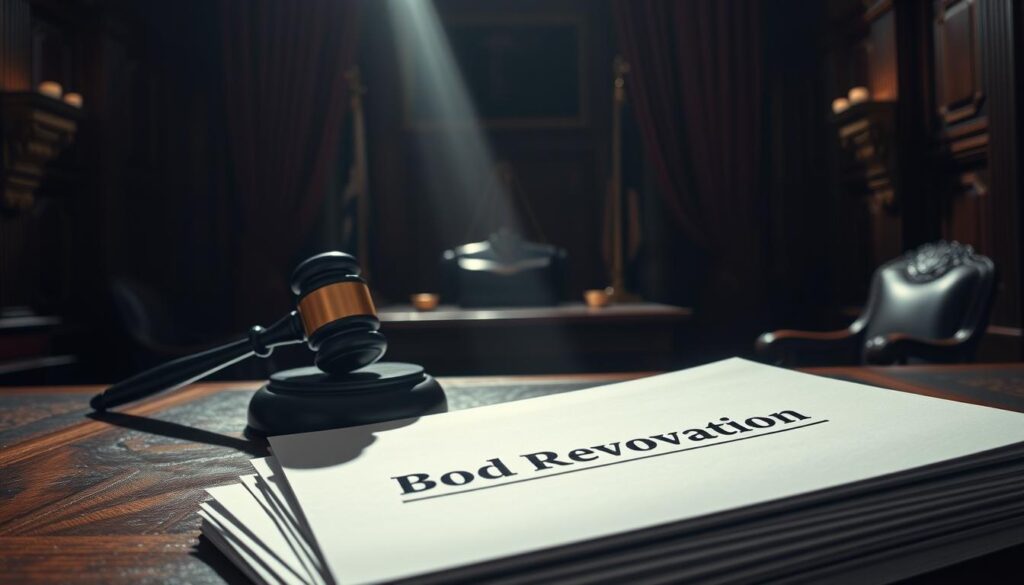
19 Feb Can a Bondsman Revoke Your Bond For a Nonpayment?
Bail bonds are key in the legal system. They let defendants get out while they wait for trial. This involves the court, the defendant, and the bail bond company. Many worry about bond revocation for not paying.
It’s vital to know about bail bond agreements. Bail bond fees are usually 10% of the bail amount. This fee is not refundable, no matter the trial’s outcome. Bondsmen can revoke a bond for many reasons, including not paying.
If a bond is revoked, the consequences are serious. The defendant might be arrested right away and go back to jail. Cosigners could owe the full bail amount. If collateral was given, it might be taken to pay the debt.
The bond and bail revocation processes are complex. They involve many people and can affect everyone involved. It’s important to understand these processes if you’re dealing with bail.
Key Takeaways
- Bail bond premiums are typically 10% of the total bail amount
- Nonpayment is a valid reason for bond revocation
- Bond revocation can result in immediate arrest of the defendant
- Cosigners may be held responsible for the full bail amount
- Collateral can be seized if the bond is revoked
- Understanding bail agreements is key for all parties
- Bond revocation processes are complex legal matters
Understanding Bail Bonds and Their Purpose
Bail bonds are key in the pretrial release process. They help defendants stay free until their trial. In California, over 2,300 licensed bail agents and organizations help with this.
What Is a Bail Bond Agreement?
A bail bond agreement is a deal between a defendant and a bail bondsman. The bondsman pays the bail, usually for 10% of the total bail. This fee is common in the U.S., including Texas.
The Role of a Bail Bondsman
Bail bondsmen act as middlemen in the pretrial release system. They check risks, post bail, and make sure defendants show up in court. If a defendant skips court, bondsmen might use bounty hunters to find them.
Financial Obligations in Bail Bonds
Getting a bail bond comes with big financial costs. The fee to the bondsman is not refundable, even if charges are dropped. Sometimes, collateral is needed, and it’s returned only after the case ends and the bond is cleared. Not meeting these financial duties can lead to being taken back into custody.
Legal Grounds for Bond Revocation
Bond revocation is a serious matter in the legal system. Courts can end a defendant’s release for many reasons. It’s key to know these reasons if you’re involved in bail.
In Florida, laws guide bond forfeiture. Florida Statute Section 903.0471 lets judges end pretrial release if there’s evidence of a new crime. This shows how important it is to act lawfully while on release.

Bond termination can happen if a defendant breaks bail rules. This includes missing court, contacting victims, or leaving the state without okay. Prosecutors must ask to revoke bond in writing within five days.
Courts look at several things when deciding on bond revocation:
- Nature of the alleged new crime
- Strength of evidence
- Defendant’s criminal history
- Community ties
- Potential danger to the public
Remember, bond revocation can lead to serious consequences. This includes longer jail time until the case ends. It’s vital for defendants to follow all bail rules and avoid crime while on release.
Common Reasons for Bond Revocation
Bail bond revocation occurs when someone fails to follow court rules. This can cause serious problems, like being arrested and going back to jail. Knowing why this happens can help people avoid these issues.
Missing Court Appearances
Not showing up for court is a big reason for bond revocation. The court needs defendants to be there for their hearings. If someone doesn’t show up, it breaks the trust the bail process is based on.
Violating Bond Conditions
Courts set rules for people on bail. These rules might include not traveling, following a curfew, or checking in regularly. Breaking these rules can lead to bond revocation. About 30% of people on bond face at least one violation before trial.
Criminal Activity While on Bond
Doing illegal things while out on bail is a big mistake. It not only breaks the rules but also shows disrespect for the law. This often means the bond is revoked right away, and new charges are added.
Payment Default Consequences
Not paying what you owe can also cause bond revocation. In some places, up to 40% of people face revocation for not paying. It’s important to talk to your bondsman if you’re having trouble paying to find a way to solve the problem.
It’s key to act ethically and follow court orders. About 50% of the time, bond revocation hearings don’t end in revocation. This is more likely if the defendant shows they’re trying to follow the rules.
The Process of Bond Revocation
Bond revocation is a serious step when someone breaks their bail agreement. The main reason is not showing up in court, which happens in about 30% of cases. It’s important to know about this process if you’re involved in the legal system.
When someone breaks their bail, the court starts the revocation process. They first issue a bench warrant for the person’s arrest. Police can arrest them anytime, even for small issues. After arrest, the person goes back to jail for a bond revocation hearing.
At the hearing, a judge looks at the case. They think about how likely the person is to skip court, the seriousness of the crime, and their past crimes. The judge might decide to cancel the bond, add more rules, or keep the original agreement. If the bond is canceled, the person must stay in jail until their case is over.
After revocation, getting the bond back is not possible, which can be very costly. For example, if someone paid $2,000 for a $20,000 bail bond, they could owe $18,000 if it’s canceled. Bail bonds in Orlando and other places face similar problems with revocations.
To avoid bond revocation, defendants must follow all the rules of their bail. This means going to all court dates, staying out of trouble, and following any special rules the court gives.
Rights and Responsibilities of Bondsmen
Bail bondsmen are key in the criminal justice system. They have rights and duties that guide their work. Knowing these can help defendants and their families better understand the bail process.
Legal Authority to Arrest
In Texas, bondsmen can arrest defendants without a warrant. This power is used if they think the defendant might not follow court orders. The Texas Occupations Code makes sure bondsmen act legally.
Prior to Breach Actions
Before taking action, bondsmen must follow steps. They need to:
- Disclose all fees upfront
- Provide receipts for payments
- Give copies of signed documents

Notification Requirements
The process of ending a bond involves certain notifications. Bondsmen must tell defendants about the possibility of bond revocation. But, they can cancel a bond without notice if they suspect non-compliance. The Texas Department of Insurance checks these actions to ensure fairness.
Bondsmen’s rights and duties balance their business needs with defendants’ rights. Knowing this helps everyone understand the bail process better.
Consequences of Bond Payment Default
Defaulting on bail bond payments can lead to severe repercussions. When individuals fail to meet their financial obligations, bail bond agencies take swift action. They aim to protect their interests and recover funds. This situation often results in a surety bond cancellation.
This can trigger a cascade of legal and financial troubles for both defendants and cosigners.

Immediate Collection Efforts
Once a payment is missed, bail bond companies start aggressive collection procedures. These may include:
- Contacting the defendant and cosigners repeatedly
- Sending formal demand letters
- Hiring collection agencies to recover the debt
Legal Actions Against Cosigners
Cosigners are not immune to the fallout of payment defaults. They can face:
- Lawsuits to recover the full bond amount
- Potential wage garnishment
- Asset seizure to satisfy the debt
Impact on Credit Score
The financial ramifications extend beyond immediate collection efforts. Missing a bail bond payment can severely damage credit scores. This makes it challenging to secure loans, rent apartments, or even find employment in the future.
This long-lasting impact highlights the importance of fulfilling bond payment obligations. Or addressing issues proactively with the bond agency.
A release condition violation, such as failing to make payments, can result in the revocation of the bond. The defendant will then return to custody. This emphasizes the critical nature of adhering to all terms set forth in the bail agreement, including financial responsibilities.
Options for Handling Payment Issues
Dealing with payment issues for bail bonds can be really tough. Bail jumping and bond estreature are big worries, but there are ways to handle them. Many bail bond companies have flexible payment plans to help clients in hard times.
If you’re having trouble with your bail bond payments, here’s what you can do:
- Contact your bail bondsman right away
- Talk about changing your payment plan
- Look into getting more cosigners
- Ask about temporary payment breaks
Bail bond fees usually cost between 10% to 15% of the bail amount. Learning about bail bonds can help you deal with payment problems better.
Talking openly is important. By reaching out early, you can often avoid serious issues like bail jumping or bond estreature. Many bondsmen are ready to help clients who are trying their best to pay.
If money is tight, don’t wait until it’s too late. Act quickly to keep your freedom and wait for your trial.
Bond Reinstatement Possibilities
After a bond cancellation or bail bond revocation, defendants may seek reinstatement. This process allows individuals to regain their freedom while awaiting trial. Courts consider several factors when deciding on reinstatement requests.
Court Requirements
The court expects timely action for bond reinstatement. Requests made within 30 days of a missed court date have a higher chance of approval. Defendants must provide valid reasons for their absence, such as medical emergencies or natural disasters.
Judge’s Discretion
Judges apply a “reasonableness test” when evaluating reinstatement requests. They consider if a reasonable person would have understood they were violating bail terms. The seriousness of the offense and the defendant’s compliance history also influence the decision.
Documentation Needed
To support a reinstatement motion, substantial documentation is key. This may include:
- Medical records for health-related absences
- Proof of transportation issues
- Evidence of family emergencies
The motion should follow local court guidelines, typically using 14-point Arial or Times New Roman font. Titles vary based on the type of bail posted. Filing fees apply, but fee waivers are available for those who can’t afford them.
Successful reinstatement benefits both defendants and bail bondsmen. It prevents the need for bail bond agencies to cover forfeited bail costs and improves the chances of a positive court outcome for the defendant.
Prevention Strategies and Best Practices
To avoid surety revocation, first understand your bail obligations. When you’re released on bail, you make a deal with the court and your bondsman. This deal has rules you must follow to avoid having your bail revoked.
Going to all your court dates is key. Missing a hearing can quickly get you into trouble. Use a calendar, set reminders, and plan how you’ll get to court. If something unexpected happens, call your lawyer and bondsman right away.
It’s also important to stay out of legal trouble. Any new crimes can cause your bond to be revoked. Try to avoid situations that might make you break the law or violate your bail conditions.
- Follow all bail conditions strictly
- Maintain open communication with your bondsman
- Pay fees on time or discuss payment plans if needed
- Stay within approved jurisdictions
- Avoid contact with possible witnesses or victims
Being financially responsible is also vital. If you’re having trouble paying, talk to your bondsman. They might offer flexible payment plans to help you stay on track. The U.S. bail system has big challenges, like crowded jails and unfair socioeconomic issues. Bail reform efforts are underway to make things fairer.
Your actions while on bail can greatly affect your case. By following these tips, you’ll have a better chance of a successful pretrial period. This shows the court you’re responsible.
Working with Armstrong Bail Bonds
Armstrong Bail Bonds helps you deal with bond forfeiture and termination. Our team knows how stressful legal issues can be. We support you every step of the way through the bail process.
Available Payment Plans
We have flexible payment plans to fit your budget. Our bail bond fees are 10% to 15% of the bail amount. For example, a $10,000 bail might cost between $1,000 and $1,500.
24/7 Support Services
Legal problems don’t stop at 5 PM. That’s why we’re here for you 24/7. Our team can walk you through bond termination and help avoid bond forfeiture.
Location and Contact Information
Visit us at 520 E. Wilson Ave. Suite 125, Glendale, CA 91206-4312. Call us anytime at (818) 241-2171 or check out our website at https://www.armstrongbailbonds.net/.
Our office is easy to find in Glendale and nearby areas. We aim to offer professional and caring service. We’re here to help you or your loved ones with the bail bond process.
Conclusion
The bail bond process is complex and has big implications for everyone involved. It’s key to understand bond revocation. Bondsmen can cancel a bond for not paying or breaking bond rules.
When a bond is canceled, it can lead to serious problems. The bond fee is usually 10% of the total, but can be up to 15%. Losing a bond means you lose the fee and might have to pay more for a new one. Defendants could get arrested again, and indemnitors might have to pay a lot of money.
It’s important to follow all bail rules and pay on time. Bondsmen need to give five business days’ notice before asking for a bond reduction. If a bond is lost, you have a year to ask for it back. Remember, the bond fee is earned when you’re released and stays until the case ends.
For those dealing with bail, getting help from experts is very helpful. Good bail bond agencies offer support and advice. They help make sure you follow the rules and avoid bail cancellation.

